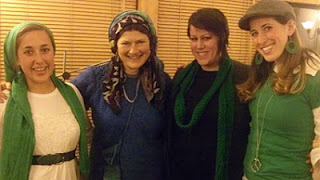 |
| Rebbetzin with “Azamra” – Sara, Rivkah and Nili |
This week’s parasha is about opening ourselves to hearing the Voice of Hashem inside of our soul, and opening spiritual blocks that clog up our channel. As I’m planning all the details of my upcoming North America Tour, I tend to get stressed out. Stress shortens our breath, closes the energy fields, and blocks us from hearing Hashem’s voice. Everything I wrote below I wrote to myself. I hope to find the time to practice the breathing meditation I developed. Please try it out as well, and let me know if it helps you to hear Hashem’s clues to you on how to solve the issues that stresses you out most!
This Parasha meditation is based on my book Women at the Crossroads: A Woman’s Perspective on the Weekly Torah Portion, Parashat Vaera, pages 51-52. If you would like to order the book, please email info@www.berotbatayin.org.
With Blessings of the Torah and the Land
Chana Bracha Siegelbaum
Read Rebbetzin’s commentary to Haftorat Vaera “Our Actions Today Empower the Future”
Parasha Meditation Vaera
Shemot 6:2-9:35
Introduction:
Yearning for Freedom
During the Egyptian Slavery, the Children of Israel were unable to hear about their forthcoming redemption, because of the heavy burden of their servitude. “Moshe spoke to the children of Israel, but they did not listen to Moshe through anguish of spirit (shortness of breath) and through hard service.”[1] People of bitter spirit cannot think about anything except how to satisfy their immediate needs. They are looking for instant relief alone, and do not have the menuchat hanefesh (ease of mind) it takes to envision redemption, or to yearn for freedom.
Obsession with “Strange Work” Blocks Hashem’s Voice Within
The Midrash explains that Israel could not listen to Moshe, because it was difficult for them to separate themselves from idol worship.[2] The term for idol worship in Hebrew is avodah zarah, which literally means strange work. Therefore, any kind of compulsion for “strange work” other than Hashem’s mitzvot can block our ability to hear the voice of G*d. Sometimes, I find it hard to separate myself from cleaning the very last dish, and rechecking my email, even if it will make me late for an important meeting. We need to pull ourselves away from the obsession with perfectly completing each professional or domestic chore. Situations may arise when our full attention is needed for something more important, whether a baby’s insistent cry or an adolescent child who wants to talk about feelings. In each case, we must stop and listen to the voice of Hashem within, and ask ourselves, “What does Hashem want from me most right now?”
Listening to the Voice of G*d in the Garden
Before sinning, Adam and Chava lived in the Garden of Eden where they could enjoy its fruits without having to work. They were free to devote themselves completely to listening to the voice of G*d. Since they misused this opportunity, it was taken away from them. From then on, man was cursed to work to earn a living by the sweat of his brow.[3] In the same way that the men in Egypt were unable to hear the words of redemption, in our times, being excessively caught up in hard work can prevent people from hearing the inner voice of G*d. Spending quality time in Nature – in the garden, listening to the birds and the wind, watching the plant life and butterflies, smelling the flowers and herbs help free ourselves to regain awareness of the Divine Voice within.
Hearing the Voice
The main challenge of exile is to free our mind from all external matters, in order to be able to truly listen. Sefat Emet urges us to detach ourselves from the emptiness of materialism in order to free our heart to listen to the words of G*d.[4] The Torah describes the inability of the children of Israel to listen as a result of literally being “short of spirit and preoccupied with hard work” – קָשָׁה מִקֹּצֶר רוּחַ וּמֵעֲבֹדָה. The word for spirit – רוּחַ/ruach can also mean wind or breath. When we are stressed and worried about money, health, or what the future may hold, without being aware, our breath begins to shorten, providing less oxygen to all the limbs of our body. This constraint could cause more and more worry and anxiety. Many scientific studies prove the correlation between stress and various illnesses.[5] To break the vicious cycle, we need to take a break from all the work and stress, and practice taking long and deep breaths, allowing Hashem’s life-giving energy to penetrate our entire being.
Relaxing our Breathing
When we breathe quickly and shorten our breath through anxiety, worry and stress, we literally close ourselves up to the world, our beloved family and friends and to the Divine Voice within us. Through relaxed elongated breaths we have the ability to open ourselves up, and get back in touch with the Voice of the Shechinah – the בַּת קוּל/Bat Kol which perpetually communicates with our soul. Hashem breathed a living soul into the nostrils of the first human being. Since then every Jew has a Divine soul and spirit. Our entire being and all our actions need to be permeated with our Divine soul – our inner life-force. Breaking this life-force by being involved in material pursuits without placing our spirit within them, is what defines קֹּצֶר רוּחַ/kotzer ruach – being short of breath. This stems from exile mentality and lack of emunah (faith).[6]
Meditation:
This meditation will with Hashem’s help counteract the קֹּצֶר רוּחַ/kotzer ruach – shortness of breath stemming from the various anxiety and stress syndromes of our times. The long and deep breathing will assist you in opening yourself up to listen and getting in touch with the Divine Voice within.
1. Sit comfortably in your chair ensuring that your back is straight. Always breathe through your nose, and try to concentrate on the soft sound of your breath – a steam like sound similar to making a ה – “h” sound with your mouth closed. When you concentrate on the sound, it will make it harder to think about other things. This makes the technique more effective and contributes greatly to its stress-coping effect. It gives your mind a rest. If any extraneous thoughts emerge, just allow them to pass through you one by one.
2. The Complete Breath
Get ready to practice the Complete Breath where you open up your entire diaphragm, torso and the top section of your lungs to fully expand. Place your hands on your belly and breathe out, trying not to slouch forward. Tighten your belly muscles to get as much air out as possible.
3. Inhaling
a. Begin to breathe in from the bottom up, letting your belly muscles relax so the air appears to fill your belly. What you are actually feeling as your belly relaxes is your diaphragm expanding fully, allowing oxygen into the entire lower section of your lungs.
b. Continue to breathe in and feel the air filling the center part of your torso. Allow your ribs to expand sideways while still breathing in. Imagine the muscles between your ribs stretching so that your ribs expand in all directions, not just forward. The stomach will automatically go inwards slightly.
c. Third, lift the chest and collar bone up while still breathing in.
Breathe in a little more and feel the air filling the very top sections of your lungs.
Even though this is described as a three part separate process, it should be done in a smooth, continuous rhythm with each part smoothly following the previous part. Try to avoid any jerky movements. Do not hold your breath, but gently start to breathe out, slowly, from the top down.
4. Exhaling
Exhaling is a more passive affair, except for the third stage when the stomach is pushed in slightly.
a. Just allow the collar bone, chest and ribs to relax, the air will go out automatically.
b. Let your ribs contract, emptying all the air from the area of your torso
c. Finally tighten your belly and push the stomach in slightly to expel any remaining air in the lungs. Do not hold your breath at the bottom of the cycle.
It is important to breathe in and out for approximately the same length of time. Most of us naturally breathe out longer than we breathe in. In the Complete Breath you are counteracting that tendency and breathing more evenly.
d. Repeat the Complete Breath 5 to 10 times for about 2-4 minutes of practice.
5. The Complete Breath to Dissolve Stress Syndromes
a. Begin inhalation in the Complete Breath while focusing on an issue that stresses you out most.
b. Exhale in the Complete Breath while imagining bursting the balloon of your stressful issue.
c. Inhale in the Complete Breath while imagining Hashem’s light entering your stressful issue.
d. Exhale in the Complete Breath while imagining dissolving your stressful issue completely.
Silent Meditative State to Listen to Hashem’s Voice Within
After having practiced Complete Breath in this manner for several minutes, allow yourself to breathe naturally for as long as you are able. Notice how your breathing has become naturally slower and deeper. Now ask Hashem: “What is blocking the issue that stresses me out the most from being open to healing.” Keep breathing naturally while opening yourself to really hear Hashem’s answer within your soul.
Notes:
Transcending Enslavement to Give Ear
During our morning prayer, we mention the Exodus from Egypt before Shema Yisrael. By freeing ourselves from our personal enslavement of Egypt – the issues that stress us out – we become ready to hear the word of G*d. Worrying and stressing too much can block us from hearing the Divine call within. G*d gave us the gift of an extra soul on Shabbat in order to free ourselves from the enslavement to our work. Shabbat is the most precious gift, to overcome shortness of breath and recharging our neshama. Refraining from the thirty-nine melachot (creative works) on Shabbat enables us to hear the word of G*d. May we all merit hearing the voice of G*d, speaking to us at every moment of the day!
[1] Shemot 6:9
[2] Shemot Rabah, Parasha 6, Piska 5
[3] Bereishit 3:19
[4] Sefat Emet on the Torah, Parashat Vayera, Year 5632
[5] See for example Relationships among stress, infectious illness, and religiousness / spirituality in community-dwelling older adults. University of Tennesse, College of Nursing, Knoxville, TN 37996, USA. Callen BL, Mefford L, Groër M, Thomas SP.
[6] Ibid.
http://www.voices-magazine.com/#
